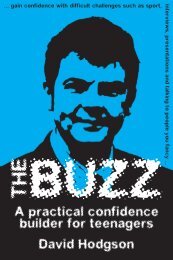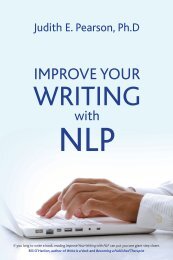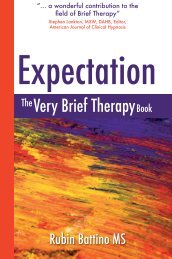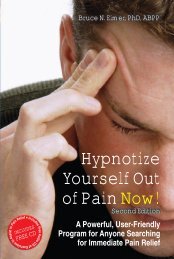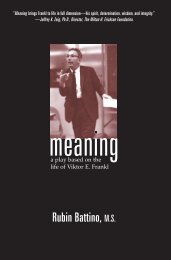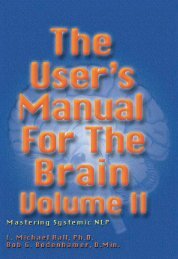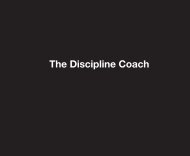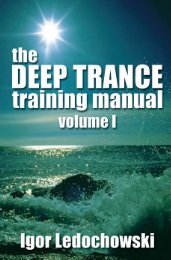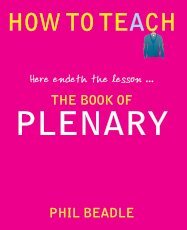Games Business Experts Play
Look Inside - Crown House Publishing.
Look Inside - Crown House Publishing.
- No tags were found...
You also want an ePaper? Increase the reach of your titles
YUMPU automatically turns print PDFs into web optimized ePapers that Google loves.
<strong>Games</strong> <strong>Business</strong> <strong>Experts</strong> <strong>Play</strong>Winning at the <strong>Games</strong> of <strong>Business</strong>L. Michael Hall, Ph.D.“Read this book. This one will completely revolutionizebusiness literature.”—Sean Kearney, Executive Director, AT&T Broadband
<strong>Games</strong> <strong>Business</strong><strong>Experts</strong> <strong>Play</strong>Winning at the<strong>Games</strong> of <strong>Business</strong>L. Michael Hall, Ph.D.Crown House Publishingwww.crownhouse.co.uk
First published byCrown House Publishing LtdCrown Buildings, Bancyfelin, Carmarthen, Wales, SA33 5ND, UKwww.crownhouse.co.ukandCrown House Publishing LtdP. O. Box 2223, Williston, VT 05495-2223, USAwww.CHPUS.comwww.crownhouse.co.uk© L. Michael Hall 2002The right of L. Michael Hall to be identified as the author of this workhas been asserted by him in accordance with the Copyright, Designsand Patents Act 1988.First published 2002.Reprinted 2003.All rights reserved. Except as permitted under currentlegislation no part of this work may be photocopied, stored in a retrievalsystem, published, performed in public, adapted, broadcast, transmitted,recorded or reproduced in any form or by any means,without the prior permission of the copyright owners.Enquiries should be addressed toCrown House Publishing Limited.British Library Cataloguing-in-Publication DataA catalogue entry for this book is availablefrom the British Library.ISBN 1899836721LCCN 2003101968Printed and bound in the UK byThe Cromwell PressTrowbridgeWiltshire
Table of ContentsPreface.............................................................................................................. iiiPart I: Figuring Out the <strong>Games</strong> of Life .......................1Overview <strong>Games</strong> <strong>Business</strong> <strong>Experts</strong> <strong>Play</strong>............................................3Chapter 1 What in the World is a “Frame Game”? ..........................7Chapter 2 Frames: The Driving Force in theGame of <strong>Business</strong> Excellence ..........................................25Part II<strong>Games</strong> for Personal Empowerment...............39Chapter 3 How to <strong>Play</strong> and Master the <strong>Games</strong> of <strong>Business</strong> ........41Chapter 4 The Power to <strong>Play</strong> Frame <strong>Games</strong> for <strong>Business</strong>Excellence.............................................................................57Chapter 5 Advanced Power for <strong>Play</strong>ing...........................................71Chapter 6 The Frames at the Top of the Mind................................83Chapter 7 <strong>Play</strong>ing <strong>Business</strong> <strong>Games</strong> with Elegance........................97Part IIILet the <strong>Games</strong> Begin!: Frames for<strong>Business</strong> Excellence.........................................107Chapter 8 Flexibly Adjusting to the New <strong>Games</strong> ........................109Chapter 9 <strong>Play</strong>ing As If Response-able..........................................129Chapter 10 Positioning to <strong>Play</strong> with Excellence .............................147Chapter 11 The Making-Work-Meaningful Game.........................161Chapter 12 When the Game of <strong>Business</strong> Gets Tough ...................177Chapter 13 Learning to Be Your Own Best Boss ............................199Chapter 14 <strong>Business</strong> <strong>Games</strong> that Enrich the Lives of Others ......219Chapter 15 Getting to Resolution: The Welcoming andResolving Conflict Game ...............................................235Chapter 16 The Game of Inventing Even Better <strong>Games</strong>...............251“The Un-End Game”: Let the <strong>Games</strong> Begin! Continue!.......................265More About Frames, Framing, Reframing and Frames of Mind........267Frame Game Secrets.....................................................................................269i
<strong>Games</strong> <strong>Business</strong> <strong>Experts</strong> <strong>Play</strong>Bibliography..................................................................................................273Glossary..........................................................................................................277Glossary of Frame <strong>Games</strong>...........................................................................283The Author.....................................................................................................287Books by the Same Author.........................................................................287The Society & Institutes of Neuro-Semantics ® ......................................289Training Available........................................................................................289Index................................................................................................................293ii
Overview<strong>Games</strong> <strong>Business</strong> <strong>Experts</strong> <strong>Play</strong>This book is about games. It’s about all of the behavioural games,speech games, even the mental and emotional games that we playin the field of business. It’s about the <strong>Business</strong> <strong>Games</strong> that theexperts play that enable them to succeed as they do. It’s about thegames that we can learn to play to replicate the success of theexperts. The book addresses how the experts think about the businessgames, and how to replicate their frames of mind. Why? Tobecome much more productive and efficient in the games that weplay. That makes this book about setting new frames of mind andrefusing the old frames and the old games that undermine success.In Part I, we will focus on figuring out frame games. This presents theidea of business as “games” and is the only theoretical part of thebook. Here I will introduce and describe frame games and how toshift your thinking about your career in terms of frames andgames. This sets the stage for everything else: how to detect andidentify the games, how to appreciate the driving power of ourmental frames and not get seduced by thinking that they are real.Part II describes the most foundational games—the games that makefor personal effectiveness in every realm. <strong>Games</strong> for personalempowerment establish the foundation for excellence and expertisein every field—personal, business, athletics, finances.Part III then gets down to business—the actual business games thatmake for expertise and excellence in business.A Template for the <strong>Games</strong>While I have a more thorough model for thinking about games inChapter 3 and have two worksheets there for more extensive frameanalysis, I have used the following template as a simple way tothink about the games in the following chapters. It follows from3
<strong>Games</strong> <strong>Business</strong> <strong>Experts</strong> <strong>Play</strong>what we mean when we talk about a set of actions and interactionsas a “game.”• The name and the description of the game: What is the game?How does it work? Does the game enhance or limit?• The rules of the game: How is the game set up, structured?Who plays the game? When?• The cues of the game: What are the questions that elicit thegame, the terms that reveal the game? What triggers recruit usinto playing the game?• The payoff of the game: What are the benefits, values, andoutcomes of the game?Intentions—Desired OutcomesRules of the GameGame DescriptionPersonPersonPayoffsCues for the <strong>Games</strong>Toxic or Empowering?It doesn’t matter what we call a game. I’ve invented lots of insightfulas well as silly titles in the following pages and I invite you todo the same with the games you play. What matters is whetherthey work for you or against you. You need to know both.<strong>Business</strong> experts do. It’s not enough to know the positive, wonderfulgames that you want to play and want to say “Yes” to.Frequently, we can’t say a thunderous “Yes” to what we want untilwe’ve said an equally impactful “Hell, No!” to the games thatundermine and sabotage our best efforts.It’s for this reason that I will constantly be contrasting BadGame/Good Game in the following pages. Your clarity on toxic orenriching will give you the personal power to cut (de-cision) a clear4
<strong>Games</strong> <strong>Business</strong> <strong>Experts</strong> <strong>Play</strong>Fifth, we will learn a structural template so that we can quickly orextensively analyze games. Frame analysis will enable us tobecome more strategic and thoughtful in our approach. It willenable us to not be blind-sided by facets of our games that wedidn’t see.Sixth, after that we will explore the world of the <strong>Business</strong> <strong>Games</strong> thatthe <strong>Experts</strong> play. This is Part III, where recommended businessgames are introduced for your success. These are the games thatallow you to take charge of your world, your responses, and yourability to make a difference. Here you’ll get to decide which gamesto say “No” to and which ones to validate with, “Yes! Let’s play!”Seventh, in the area of business, as in most other complex domainsof life, there will be games for different seasons. <strong>Games</strong> for positioningyourself (Chapter 10), games for making work meaningfuland satisfying (Chapter 11), games for handling things with masterywhen things get tough (Chapter 12), games for being yourown best boss (Chapter 13), games for adding value to the lives ofothers (Chapter 14), games for resolving conflicts (Chapter 15),and games for inventing even better games (Chapter 16).Ready to <strong>Play</strong>?If you’re ready to go to it, then I’d recommend you read the bookin its entirety to get a sense of the overall game plan. Then returnwith a game-plan notebook and the ability to play the ImplementationGame. Then you can pick and choose the games of businessexcellence that you want to make yours.6
Chapter 8Flexibly Adjusting tothe New <strong>Games</strong>There’s a New Game in Town<strong>Games</strong> in this chapterThe Flexibility GameThe “Know Thyself” GameThe Self-Responsibility GameThe Aim GameThe Personal Boundaries GameThe “Managing Your Own Behavior” GameThe “Learning and Unlearning” GameThe “Accepting Uncertainty and Taking Risks” GameThe Context GameThe Personal Resourcefulness GameThe Implementation GameThe Discounting Game• What frame games do I need to play in order to succeed?• What are the central features of business today that I need toknow about and deal with effectively?• To be a genius at work, what models, skills, and states do Ineed in order to get to the top?• How often do you think about fully accessing your personalwork genius?• What specific understandings support and empower us indeveloping excellence for work tasks?109
<strong>Games</strong> <strong>Business</strong> <strong>Experts</strong> <strong>Play</strong>When it comes to business in the twenty-first century, there’s awhole new set of new games in town. “The times, they are achangin’” has become especially true for the work environment.In Smart Work (1995), Lisa Marshall and Lucy Freedman describethe new workplace that has been emerging, and that will continueto evolve, in the new century. They primarily focus on the newworkplace as becoming increasingly knowledge-intensive andservice-based. These are the new games. Work demands, and willcontinue to demand, more from us as we face greater diversity andan ever-increasing global economy and world market.In this new century, we can expect the continual growth of technology,an increase in information, and an ever increasing pace ofchange that will challenge all of us in new and different ways.Marshall and Freedman have suggested nine guiding principlesfor anyone who wants to survive in the new workplace (seeFigure 8:1). I quote these guidelines here to highlight that the newgames fall into two categories: intrapersonal and interpersonal.The interpersonal category comes as no surprise. Yet it does highlighthow work has become more and more people- and knowledge-intensive,and how it will continue in this direction. Thismeans the building and maintaining of rapport games will becomeincreasingly important. Getting along with others will become lessand less optional. As business becomes more sales- and serviceoriented,listening, questioning, and connecting skills will play acrucial role. <strong>Business</strong> will become more psychological in the sensethat we will be called upon to understand and relate to others.This domain of interpersonal relations will also highlight the significanceof communication, conflict management, “getting to resolution,”or defusing hotheads.The big surprise for many people, if not for most of us, involvesthe intrapersonal category. Psychological awareness, intelligence,and skills are going to become increasingly important. Are youready for that? The features in this category indicate that businesssuccess will become much more dependent, not on what you do orcan do, but on your attitude, your state, your self-awareness andself-knowledge, and your ability to manage your own mind and110
Flexibly Adjusting to the New <strong>Games</strong>life. Yet business experts already play these games, and with skill.They embrace the “psychological” nature of business knowingthat they cannot eliminate the human factor, nor do they want to.Figure 8:1Guidelines for the New Workplace1. Develop self-knowledge2. Take self-responsibility3. Hold clear vision and values4. Manage personal boundaries5. Manage your behavior6. Build bridges7. Manage conflicts8. “Unlearn” and learn9. Accept uncertainty and take risks (pages 4–7)It is precisely in this that the magic of frame games becomes exceedinglyuseful and powerful. These intrapersonal skills support andcomprise the structure of excellence or genius at work. This generatesa new perspective about the games of business. It allows usto view the first five items listed in Figure 8:1, along with itemnumber 8 and, as some of the new games that we will need tolearn. All of these have to do with our mind–body states of consciousnessor our frames of mind. These make up our basic attitudeas derived from our model of the world and govern thegames that we can and cannot play.The Flexibility GameCues: It’s the tremendous turbulence of change in the field of businessthat calls for the need for flexibility. Even the pace of thischange is increasing. Though change has always been with us, theacceleration of change, along with the explosion of knowledge andtechnology, suggests that we most fundamentally need to learnThe Flexibility Game if we want to effectively adjust to the changingtimes.Descriptions: The Flexibility Game contrasts with The RigidInflexibility Game. Traditionally we have used the black-and-white111
<strong>Games</strong> <strong>Business</strong> <strong>Experts</strong> <strong>Play</strong>thinking of Aristotelian logic to create a rigid business plan andthen stay with it for a lifetime. That doesn’t work any longer.While both flexibility and inflexibility as frames and games havetheir place and usefulness, today’s business climate has shifted insuch a way that only the flexibility frame works.Certainly there are some things toward which we should adoptmore of a black-and-white orientation, yet in most things we needa more flexible attitude. This is especially true in the business context,where change is the great constant, where markets fluctuate,where new products come and go.In addition, with the growing complexity in today’s world, weneed more ability to flexibly shift gears and to keep adjusting tothe ever changing environment. Some writers describe this as“sensitive to context.” This means that, as such things as contexts,technology, environment, infrastructures, and information change,so do we. Flexibility enables us to become change masters, ratherthan its victims. We need the flexibility of the tennis player whonever knows where the market will serve the next change, but isready to move there quickly to stay in the game.Cues: Successful business people learn how to ride the tides ofchange—and even pioneer the coming changes, rather than resist,resent, or become rigid about change. As they play The Ever Readyto Change Game it allows them to stay abreast of new developmentsand to waste no time pining over “the good ol’ days.” Excellencein this area emerges from leading the way in creating the changesand in mastering coping with changes. This calls for flexibility.This also calls for a new way of thinking. It calls for a whole newset of questions, questions that allow us to recognize the cues as towhen to play the game.• What changes are currently taking place?• What changes can we anticipate in our field in the next one,three, five, or ten years, or even in the next six months?• What forces, factors, and influences are contributing to thesechanges?• What will people need and/or want in order to handle andmaster this area in the future?112
Flexibly Adjusting to the New <strong>Games</strong>• What resources, tools, technologies, and processes will bestgive people a handle on the future?• What information will give us the best mapping for forecastingfuture changes?Contrast: The Rigidity Game emerges from a different kind of thinking.Black-or-white and Either/Or thinking punctuates the worldin terms of only two choices: this or that. In attempting to bringorder and structure to the world, it oversimplifies. Yet in doing so itcreates delusions and blind spots. Very few things are of the bivalentEither/Or form. This old form of Aristotelian “logical” thinking(the excluded middle) fails to deal with and thereforeaccurately map a world of multiple choices, the grays, and thethings in between.This is a problem of levels. It is the meta-level structure of believingin our beliefs. Believing is one thing. Believing in somethingmeans we are confirming a thought that maps some territory. But,when we believe in our beliefs, we then become so convinced inour belief that it shuts out new information and feedback.Information that may call the belief into question is eliminated.This makes for fanaticism. It creates what the sociologist EricHoffer called “the True Believer”—the closed-minded, narrowminded,convinced-even-against-the-facts type of thinker. Nowthat’s a very different game.The need for flexibility arises from the very nature of our mentalmaps. We need flexibility to update and change our thoughtsbecause all of our representing and validating of beliefs is fallible,and because at best they are just a replica of the territory, and notthe territory. Given this fallibility, we need to constantly check ourmaps against the external situations and make appropriate adjustmentsas necessary.When you appreciate the value of flexibility and develop someskill in adapting, changing, and transforming, then the followinggames of the new workplace become easier.Payoffs: The payoffs of this game are many: relevance, fittingness,ability to stay sharp and current, ability to anticipate trends and torespond appropriately, proactivity, wise and profitable choices.113
Acclaim for <strong>Games</strong> <strong>Business</strong> <strong>Experts</strong> <strong>Play</strong>.“From a premier modeler and a master at his craft comes a book thatgives you an opportunity to peek into the minds of those who have beensuccessful in business and understand the games they play. Thiseasily-read book gives you models to replicate and thus achieve successon the playing field of business. If business is your game, this is thehandbook to have.”—Stephen Campbell, Performance Coach, NLP and Neuro-Semantics Trainer“Dr Hall clearly describes practical concepts that can empower us to bemore effective in the workplace.”—Pascal J. Gambardella, Ph.D.“I consider this book the evidence that business expertise can be modeledin such a way that it is possible to be duplicated. I know that this is a“must read” for us to accelerate the development of our businessacumen. Any reader can only come away richer having discovered howthe experts do it from the inside, and that it is possible to do so also.”—Armand Kruger, M.A. (Psych), International Modeling Consultant;Founder of Neuro-Semantics in South Africa“This book provides the insight and all the tools needed to help peoplewithin an organization operate with greater effectiveness.”—Addison Woods, Regional Manager, TouchVision, Inc.<strong>Business</strong>/Training/NLPISBN 189983672-1£25.00 UK$34.95 USA59435Crown House Publishing Limitedwww.crownhouse.co.uk9781899836727



